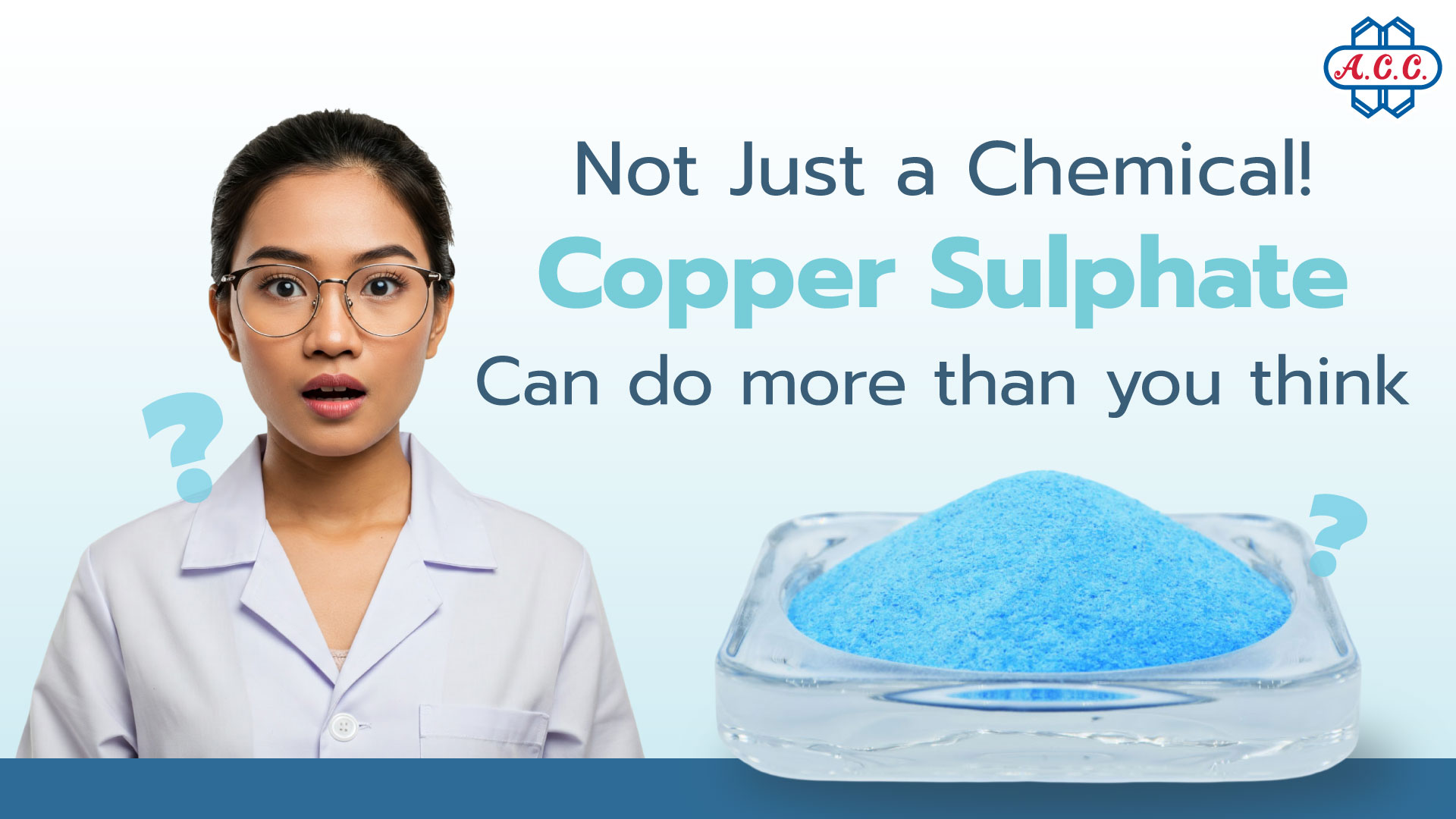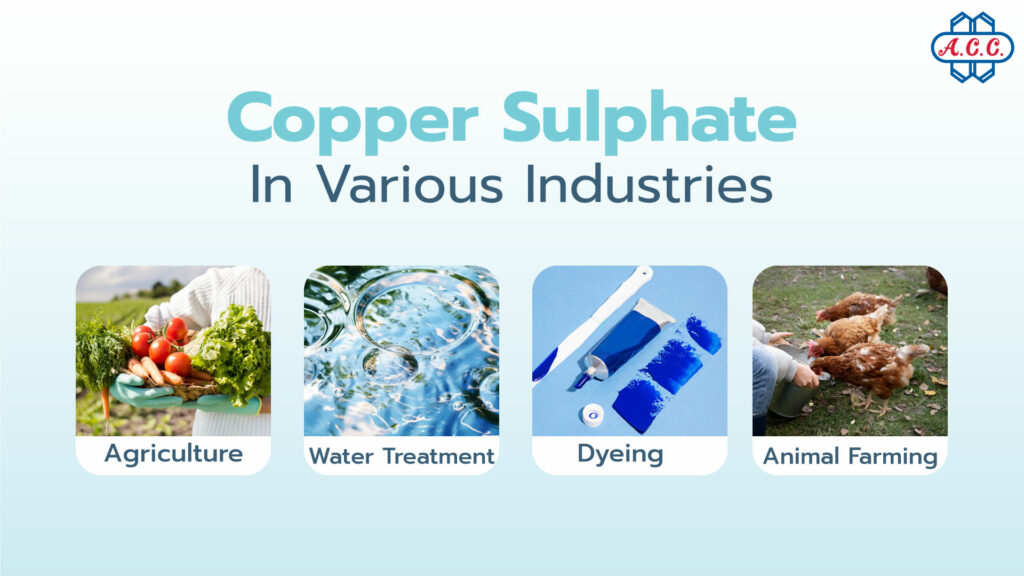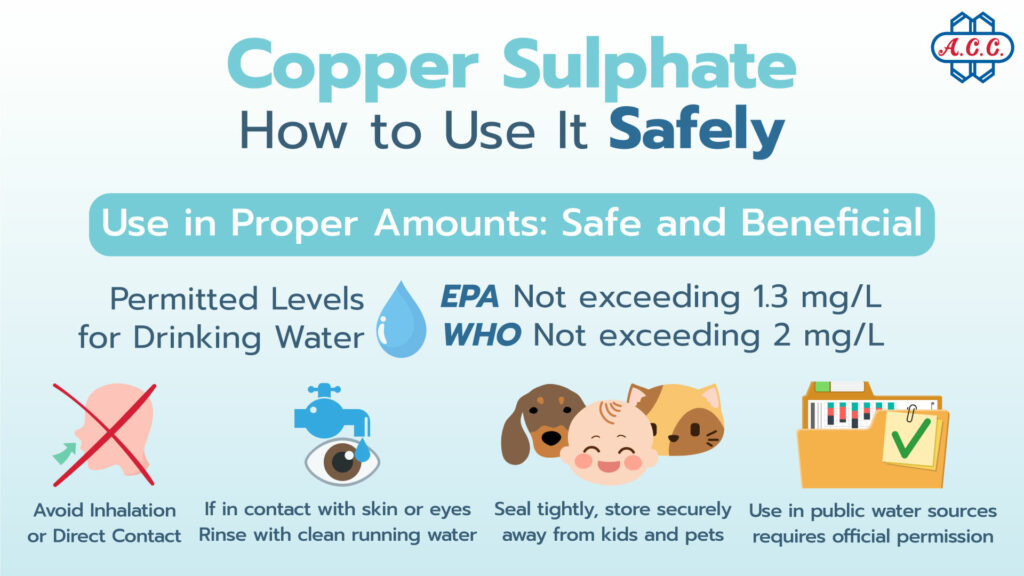
12 Apr Not Just a Chemical! Copper Sulphate Can do more than you think
Copper Sulphate may seem like a chemical you’ve never heard of before, but believe it or not, it’s more present around you than you might think. If you’ve ever seen a crystal-clear blue swimming pool, or used something to protect your fruits and vegetables from fungi, then that’s Copper Sulphate!
Have you ever wondered how swimming pools stay clean without any algae or green slime? How do they do it? The answer is “Copper Sulphate.” This chemical plays a vital role across various industries, from agriculture to wastewater treatment and it’s something you might encounter in your daily life more often than you realize.
What is Copper Sulphate?
Copper Sulphate also known by some as “Blue Vitriol” is a chemical compound composed of Copper (Cu), Sulfur (S), and Oxygen (O) with the chemical formula CuSO₄. Generally, Copper Sulphate comes in two main forms: Anhydrous and Hydrated (Pentahydrate – CuSO₄·5H₂O), the latter being the most commonly found form.
Anhydrous Copper Sulphate is a form without water molecules in its structure, appearing as a white or grey powder. On the other hand, the hydrated form contains water molecules, giving it a vibrant blue crystalline appearance and making it easily soluble in water. When hydrated Copper Sulphate is heated and loses its water content, it transforms into the anhydrous form and its color changes from blue to white or grey.
Why is Copper Sulphate Important?
When we talk about chemicals widely used across industries, Copper Sulphate is one of them. It’s used in everything from agriculture, shrimp, pig and poultry farms, to mining and water treatment industries. Imagine if Copper Sulphate didn’t exist, the water we drink could be filled with algae, our crops might be plagued with fungi and even the paint we use daily might not be as vibrant as it is.

Applications of Copper Sulphate in Various Industries
-
Agriculture
Used as a fungicide on crops like grapes, tomatoes and other horticultural plants. It helps prevent downy mildew, leaf spots, blight, etc. It also supplements copper nutrients in the soil to stimulate plant growth and balance soil minerals. Additionally, it controls algae in rice paddies and aquaculture ponds, helping manage pests and snails that destroy crops and disrupt ecosystems.
-
Mining and Metallurgical Industries
Used in the flotation process for copper ore extraction, helping separate copper ore from other materials effectively. Also used as an etchant in metalwork to clean surfaces before welding or coating steel, copper and other metals.
-
Water Treatment and Environmental Sectors
Serves as a disinfectant in water systems such as swimming pools, fish ponds or reservoirs, preventing the overgrowth of algae, bacteria and harmful microorganisms. It’s also used in wastewater treatment systems to reduce heavy metal ions, kill certain bacteria and improve water quality.
-
Textile and Leather Industries
Used as a coloring agent in textiles and ceramics to enhance color vibrancy and durability. Also applied in leather tanning to adjust protein structures, making leather softer and more durable.
-
Animal Feed Industry
Acts as a copper nutrient supplement to aid animal growth, bone development and immune function. It is also used as an antimicrobial agent in aquaculture farms to prevent parasite and bacterial growth.
-
Electronics Industry
Used in the production of Printed Circuit Boards (PCB) as part of the copper plating process to enhance electronic components’ quality and conductivity.
-
Medical and Pharmaceutical Industries
Used as an antibacterial and antifungal agent for treating skin diseases in animals, such as foot rot in cattle. It’s also used as a feed additive to prevent copper deficiency.
Is Copper Sulphate Safe?
Copper Sulphate is a useful substance and can be safely used when handled in proper amounts. Regulatory bodies such as the EPA (Environmental Protection Agency) and WHO (World Health Organization) set limits for copper sulphate in drinking water, not exceeding 1.3 and 2 milligrams per liter (mg/L), Respectively, to ensure long-term safety and prevent health issues from overexposure. However, excessive use can also impact the environment, so it must be used strictly according to guidelines.
• Avoid prolonged inhalation or direct contact, as it may cause skin and respiratory irritation.
• If it comes in contact with skin or eyes, rinse immediately with clean running water for 15–20 minutes. Seek medical attention if severe irritation or allergic reaction occurs.
• Store in a tightly sealed container and keep out of reach of children and pets.
• Public water applications require permission from relevant authorities to prevent environmental harm.

Conclusion
Copper Sulphate is a chemical that plays a crucial role in various industries, supporting efficient operations and making our lives more convenient. Despite its many benefits, it must be used with caution and in accordance with safety guidelines to prevent potential harm to health and the environment.
High-Quality Copper Sulphate for Industrial and Agricultural Use
Asian Chemical Co., Ltd. is a leading manufacturer and distributor of industrial chemicals, committed to providing high-quality products that meet certified standards. Ideal for water treatment, agricultural industries, and a wide range of small to large-scale industrial applications.
If you would like more information about how to use Copper Sulphate or need expert advice on selecting the right chemical for your needs,
please contact us:
📞 Tel. +66 (38) 570 150-2 ext. 106, 107 or +66 (87) 8325 824
📩 E-mail: [email protected]
🌐 Website: https://acc1976.com
🏢 Asian Chemical Co., Ltd.
85/1 Moo 5, Wellgrow Industrial Estate, Bangna-Trad Rd., Km. 36, Bang Samak Subdistrict, Bang Pakong District, Chachoengsao Province 24130, Thailand



No Comments